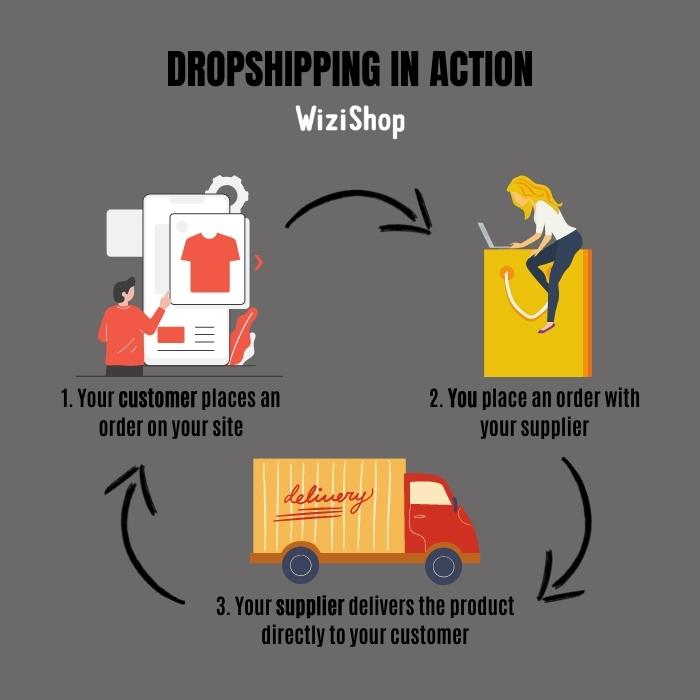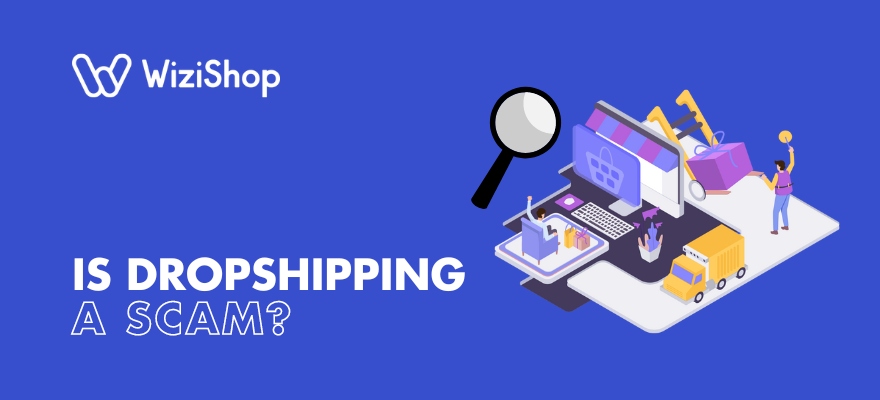In recent years, dropshipping, as a type of ecommerce, has emerged as a popular business model, touted for its low entry barrier and potential for huge profits. However, as with any rapidly growing industry, it has attracted its share of skepticism and controversy.
This article delves into the mechanics of dropshipping, examines the myths and realities, and provides an objective analysis to answer the pressing question: Is dropshipping a scam or a legitimate entrepreneurial venture?
Table of contents
- What is dropshipping? Is it legal?
- Is dropshipping a scam?
- So why do some think dropshipping is bad?
- For many, dropshipping = AliExpress
- Do people actually get rich from dropshipping?
- Why is dropshipping worth it? The advantages
- How to avoid dropshipping scammers as a business owner
- Dropship dilemma: Navigating the ethics of dropshipping
- Test affiliate marketing, an alternative to dropshipping
What is dropshipping? Is it legal?
You're probably hearing about dropshipping all over the web. But what does dropshipping really mean?
The principle is quite simple. Dropshipping is a completely legal business model. Dropshipping differs from traditional ecommerce in that the website sells products it doesn't keep in stock.
You sell a supplier's products on your ecommerce site, without having to manage the logistics or buy the products beforehand.
When you make a sale, you contact your supplier and give them the end customer's delivery details. The supplier then ships the order. Then, you earn a margin on the sale.
As with any legitimate business, it's important for dropshippers to operate transparently, fulfill orders promptly, and provide excellent customer service to maintain legality and uphold consumer trust.
Here's how it works:

Is dropshipping a scam?
Since dropshipping began increasing in popularity, numerous media outlets, newspapers, and influencers have published reports and information about dropshipping. Publications by popular sites all around the world have created a veritable wave of controversy and reaction around this online activity.
So what are we to make of all these opinions on dropshipping?
I'll simply answer this question with a few others:
- Do you buy products in supermarkets?
- Do you go to supermarkets?
- Do you watch TV shopping shows?
- Do you order items from popular marketplaces like Amazon or eBay?
Chances are you'll answer yes.
So, you're buying or interested in products from the major dropshipping players.
According to the Huffington Post's definition, dropshipping consists of "reselling products purchased from a supplier at much higher prices."
This is exactly what these retailers do. They buy products from suppliers at an attractive price, which they then resell at a higher cost. This allows them to earn a profit.
I'm sure you'll agree that this is nothing more than traditional commerce. And it's been around for centuries!
The only difference between traditional commerce and dropshipping lies in the delivery. In stockless online selling, the supplier or wholesaler sends the product directly to the end customer. The distributor is therefore an intermediary who ensures the visibility of the producer/supplier's products.
So why do some think dropshipping is bad?
The argument that dropshipping is a scam is based on factors that depend solely on the seller and their bad practices, not on the activity itself.
Questionable practices
For example, those who make big money on poor-quality products that don't comply with current legislation or on counterfeit goods (like the bad buzz surrounding the fake AirPods).
There are also a multitude of dubious partnerships on social networks.
More often than not, it's well-known influencers who make a habit of presenting dubious products on their social networks with misleading communications. By presenting goods that don't comply with current regulations or copies of patented products, numerous scandals have broken out on the web.
The whistle-blowers are often members of their own community or dropshipping gurus, annoyed by the campaigns.
The media's stigmatization
The direct consequence of these events is that members of the media often have a pejorative image of dropshipping. And journalists aren't always interested in digging deeper to discover the inner workings of dropshipping and realize that it is, quite simply, a classic form of marketing.
Despite statistics proving that dropshipping is a serious business, some journalists' doors have remained closed. For them, it's a scam, period. And that's unfortunate for opinion leaders.
For many, dropshipping = AliExpress
For most people, dropshipping is confined exclusively to the AliExpress supplier platform, and wrongly so.
As a result of the scandals mentioned above, AliExpress is often equated with poor-quality products, mediocre service, and questionable margins.
Fortunately, there are reliable suppliers on AliExpress, and many dropshippers operate ethically on the AliExpress platform.
What's more, there are hundreds of dropshipping suppliers, not just AliExpress!
Every retailer is free to dropship with any supplier. There's nothing to stop you from contacting a supplier in Europe, canvassing an American ecommerce company to resell its products, or even visiting your local boutique and showcasing the seller's creations on the internet.
Quality dropshipping, as practiced by many e-tailers, is not controversial. Quality products, item conformity, delivery within a few days, consistent resale price... This dropshipping is reliable and profitable. In no way is it a scam.
Do people actually get rich from dropshipping?
Dropshipping can indeed be a lucrative business model for some entrepreneurs, but it's not a guaranteed path to wealth. Success in dropshipping largely depends on factors such as selecting the right niche, maintaining a strong supplier network, effective marketing strategies, and competitive pricing.
While there are stories of individuals who have made significant profits through dropshipping, these successes typically involve a combination of market insight, dedication, and sometimes a bit of luck. Aspiring dropshippers should approach this model with realistic expectations and be prepared to invest considerable effort and resources into building and scaling their business.
Why is dropshipping worth it? The advantages
Now you're about to discover the various advantages of dropshipping: a business accessible to all!
1. Low initial investment
Selling on the internet normally requires a certain initial investment to set up a sales site....
One of the major pros of dropshipping is that you need very little money to get started. By starting an e-business with this business model, you'll spend very little money. An ecommerce site with inventory to stock and ship is much more expensive!
This low investment attracts many people, experienced sellers and newbies alike, to become dropshippers.
Few people are in a position to launch a business with an investment of several thousand dollars. With dropshipping, you only need a few hundred dollars to create a website and generate sales to become profitable.
Your first investment will be in your domain name and in the solution for creating your site. It's crucial to choose a high-performance platform like WiziShop with the Dropizi dropshipping Chrome extension, which automates all dropshipping processes for your company: importing products, taking orders, etc.
Try WiziShop free for 7 days
THE EASIEST NO-CODE ECOMMERCE SOLUTION✅ No credit card required
✅ Access to all features
✅ No commitment
The second investment will be in advertising, which will generate a return in terms of sales, so it'll pay for itself in no time!
2. No stock, no delivery: Reduced risk
These days, anyone can launch an ecommerce site, especially a dropshipping site! You'll never have to worry about managing stock or deliveries.
Logistics don't exist, and that's one of the great strengths of this business! This means you'll save hundreds of thousands of dollars.
Investing in a warehouse to store products, manage orders, and pack each parcel can be very tedious, time-consuming, and expensive.
Because you don’t hold inventory, you’re not susceptible to losses from unsold stock, which can be a significant financial drain for traditional retailers.
You'll be able to focus solely on the marketing aspect of your ecommerce store and think about how to sell your products to generate maximum sales by creating a solid line of communication with your both your current and future customers (Google Ads, Facebook Ads, other paid advertising, product description writing, email marketing, SEO, etc.).
3. Ability to sell the products you want
People often say they don't want to get into ecommerce because they don't know what to sell...
With dropshipping, you sell what you want!
For example, Dropizi's integrated suppliers such as BigBuy, BrandsDistribution, and BusyX Pro give you the opportunity to choose from their thousands of products. They have a vast catalog of varied products at supplier prices.
You're free to add any product you like to your store. And above all, you're free to target customers in a specific market, by opting for the niche market of your choosing!
Over time, you'll even be able to add products to offer new products to your customers.
By focusing on a specific market, you're far more likely to be profitable and earn money with dropshipping than with a classic, general ecommerce business.
Dropshipping allows you to specialize, and there are far fewer competing stores. And if there's less competition, there's less work to be done on your digital marketing strategy and therefore less investment.
You'll become a benchmark in the field much more easily and quickly by targeting a specific population with specific products in the same theme.
Admittedly, traffic and sales in the sector are lower, but in dropshipping, you have to think in terms of margin! And if you target a niche market, your margin will be much higher. You need to differentiate yourself to avoid the disadvantages of dropshipping.
Let's take an example: you probably have people around you who are focused on their phone, tablet, or computer. You'll agree that each of these people has points of interest. By targeting a niche dropshipping market, you'll be able to seek out precisely those people who are interested in your products and display your ads to them!
A dropshipping business lets you test your products. If you notice after several weeks that your items aren't selling, you can quickly change them!
All you have to do is choose another product from a marketplace or supplier, import it into your store, and write the product description. This strategy will enable you to find the perfect product that interests your buyers.
4. Lots of flexibility: Work where and when you want
With dropshipping, freedom is yours! You'll be able to work from home or at the local café, in the evening or in the morning... It's one of the few types of businesses that allows you so much flexibility.
Why not make the most of it?
So not only do you benefit from flexible opening hours, but so do your customers! With a dropshipping store, every internet user can visit your website 24/7, on holidays, weekends... 365 days a year!
You're open at all hours, and when you generate an online sale, you could be taking a stroll in the park, doing yoga, or even on vacation on an island paradise on the other side of the world... Isn't that great? Say goodbye to opening and closing times or unforeseen events at work.
5. Unlimited potential when it comes to customers!
The notion of openness is also linked to the notion of the number of customers.
Unlike a physical store, a dropshipping store can target an infinite number of customers!
A company that has a physical store will be restricted by its geographical location, whereas your site can be open to the whole world! This is one of the great strengths of a dropshipping site.
You can welcome hundreds and thousands of people to your store at the same time, all over the world.
How to avoid dropshipping scammers as a business owner
Dropshipping, while legitimate, can sometimes be marred by scams that new entrepreneurs need to be aware of to protect their business. Common dropshipping scams include dealing with fraudulent suppliers who fail to deliver products, provide counterfeit goods, or inflate prices after an agreement is made.
To avoid these pitfalls and avoid scammers, it's crucial to thoroughly vet suppliers. This can be done by checking their credibility through reviews, asking for references, and ordering samples to assess quality.
You'll also want to be sure to secure a transparent agreement that details supplier contact information, product quality, order fulfillment times, and return policies. Using reputable dropshipping platforms and payment systems can also safeguard your business against scams by ensuring more secure transactions and better compliance with business standards.
Dropship dilemma: Navigating the ethics of dropshipping
Dropshipping sometimes gets a bad rep.
The most important thing is to ignore the various controversies and focus on quality, ethical practices, and great customer service to ensure a positive reputation for your business. Of course, to succeed, you have to invest. And that means
- finding local suppliers,
- finding quality products,
- creating a real brand, and
- working on your communications strategy.
The WiziShop platform also offers comprehensive video training courses on a variety of topics related to selling on the internet. This will enable you to get started efficiently and learn all the best ecommerce practices.
In short, this business is full of opportunities and benefits linked to ecommerce and digital selling. With online sales solutions like WiziShop's Dropizi extension, you can get started quickly and easily, with the support you need to take advantage of this colossal ecommerce market!
Try WiziShop free for 7 days
THE EASIEST NO-CODE ECOMMERCE SOLUTION✅ No credit card required
✅ Access to all features
✅ No commitment
Test affiliate marketing, an alternative to dropshipping
Affiliate marketing and dropshipping are two popular ways of making money online, but each has its own advantages and disadvantages. If you're trying to decide which is best suited to your needs, here are a few key points to consider about affiliate marketing:
- There's no need to stock or manage products.
- There are no shipping costs or logistics management.
- There's the possibility to earn more than with dropshipping over the long term.
- You're able to use multiple affiliate sites and therefore multiply your opportunities.
- You can promote several products at the same time.
Ultimately, the choice between affiliate marketing and dropshipping depends on your objectives, your experience and your comfort level with managing business operations. If you're looking for a quick and easy way to make money online without managing products and logistics, affiliate marketing could be the ideal solution for you.
Become an affiliate marketing whiz in no time with Evolup! You'll love our easy-to-use online platform for creating your own affiliate site. And don't worry, we'll take care of all the SEO for you! The built-in AI will give you a hand in finding your niche, choosing a domain name and writing all your texts in a matter of seconds.
With the help of our team of business coaches, you'll be making a living from your passions in no time! And best of all, you won't even have to spend a fortune: subscriptions start at just $10 a month. Try Evolup free for 7 days and get ready to achieve your goals!











